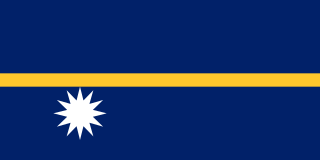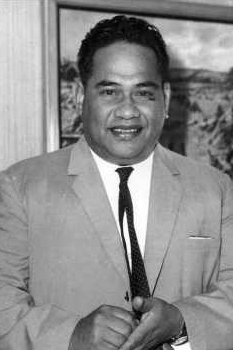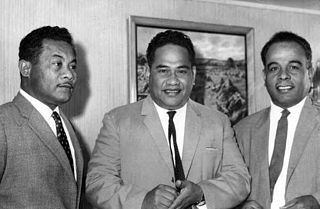 |
|---|
Elections for the Legislative Council for the Territory of Nauru were held for the first and only time on 22 January 1966. [1]
 |
|---|
Elections for the Legislative Council for the Territory of Nauru were held for the first and only time on 22 January 1966. [1]
Nauru had been under Australian administration since World War II. In 1962 the United Nations General Assembly voted by 80 –0 that the island should be granted independence. [2] The United Nations Trusteeship Council subsequently requested that the Australian government set up a Legislative Council. [3] The Parliament of Australia passed the Nauru Act 1965, which established the Legislative Council for the Territory of Nauru. The new body had fifteen members, comprising nine elected members, one ex officio member (the Administrator), and five "official members" (appointed by the Governor-General of Australia on the nomination of the Administrator). [4]
The electoral system remained the same as for the Local Government Council; the fourteen districts of Nauru were grouped into eight constituencies. Seven constituencies elected one member, whilst one elected two. [5] A total of 24 candidates stood for the nine seats. [6]
Hammer DeRoburt (Boe constituency) and Roy Degoregore (Anetan and Ewa) were both elected unopposed. [7] All elected candidates had previously been members of the Local Government Council at some point. [7]
| Constituency | Elected members |
|---|---|
| Aiwo | Samuel Tsitsi |
| Anabar | James Doguape |
| Anetan | Roy Degoregore |
| Boe | Hammer DeRoburt |
| Buada | Austin Bernicke |
| Meneng | James Ategan Bop |
| Ubenide | Buraro Detudamo |
| Victor Eoaeo | |
| Yaren | Joseph Detsimea Audoa |
| Source: Viviani | |
The new Legislative Council was opened by Australian Minister for the Territories Charles Barnes on 31 January 1966, [1] which marked the twentieth anniversary of the return to Nauru of survivors of the World War II deportation of islanders during the Japanese occupation. [7] Hammer DeRoburt was re-elected as Head Chief by the Council after the elections. [7]
Victor Eoaeo resigned from the Legislative Council on 30 November 1967. [8]

The history of human activity in Nauru, an island country in the Pacific Ocean, began roughly 3,000 years ago when clans settled the island.

Hammer DeRoburt was the first President of the Republic of Nauru, and ruled the country for most of its first twenty years of independence.

The Parliament of Nauru has 19 members, elected for a three-year term in multi-seat constituencies. The President of Nauru is elected by the members of the Parliament. The number of seats was increased to 19 following elections in 2013.

Nauruan nationality law is regulated by the 1968 Constitution of Nauru, as amended; the Naoero Citizenship Act of 2017, and its revisions; custom; and international agreements entered into by the Nauruan government. These laws determine who is, or is eligible to be, a national of Nauru. The legal means to acquire nationality, formal membership in a nation, differ from the domestic relationship of rights and obligations between a national and the nation, known as citizenship. Nauruan nationality is typically obtained either on the principle of jus soli, i.e. by birth in the Nauru or under the rules of jus sanguinis, i.e. by birth to parents with Nauruan nationality. It can be granted to persons with an affiliation to the country who has lived in the country for a given period of time through naturalization.

Raymond Gadabu was a Nauruan politician who served as Head Chief between 1953 and 1955.

Parliamentary elections were held in Nauru on 23 January 1971. As there were no political parties, all candidates ran as independents. Following the election, Hammer DeRoburt was re-elected president by members of the Parliament.

Parliamentary elections were held in Nauru on 18 December 1976. Following the election, Bernard Dowiyogo was elected President by Members of the Parliament.

Early parliamentary elections were held in Nauru on 12 November 1977, after Parliament had been dissolved by President Bernard Dowiyogo due to a sustained campaign against the government led by former President Hammer DeRoburt, who had been voted out of office the previous year. Particular controversy had been caused by the Supply Act passed in June, and Dowiyogo stated that elections would be held to give him a mandate. After Parliament failed to approve the budget, Dowiyogo asked Speaker David Gadaroa to dissolve the legislature.

Elections for the Local Government Council were held for the first time in Nauru on 15 December 1951.

Elections for the Local Government Council were held in Nauru on 10 December 1955.

Elections for the Local Government Council were held in Nauru in late 1959. Seven of the nine incumbent councillors were re-elected and Hammer DeRoburt was re-elected as Head Chief by the Council.

Constitutional Convention elections were held in Nauru on 19 December 1967.

Elections for a Legislative Assembly were held in Nauru on 26 January 1968.
Buraro Robidok Bagewa Detudamo was a Nauruan politician. He was the only son of Timothy Detudamo and brother-in-law to Kennan Adeang. When Buraro was a boy, his family went to Chuuk Islands.

Austin Bernicke was a Nauruan politician. He was a member of the first Local Government Council in 1951, then a member of Parliament after it was established in 1966, serving until his death in 1977. He also served as a cabinet minister from 1968 until 1976.

Joseph Detsimea Audoa was a Nauruan politician. He served as a member of the Parliament of Nauru and its predecessors from 1955 until his death and was a cabinet minister for much of the period 1968 to 1983.

James Ategan Bop was a Nauruan politician. He served as a member of Parliament and its predecessors from 1951 to 1955 and then from 1959 until his death, and was Minister of Finance for most of the period between 1968 and 1978.

Ludwig Dowong Keke is a Nauruan politician, diplomat, and dentist. Keke was Nauru's first university graduate. He worked as a dentist in Australia before returning to Nauru to enter politics by 1967, first being elected to the Constitutional Convention, and then to the Legislative Assembly. He served in the parliament until 1972. After 1977, he served as a dental officer in Western Australia. He then served as a dental officer for the South Pacific Commission in 1981. He returned to Nauru and served three terms in the parliament between 1986 and 2000, serving as speaker of parliament in his final term. By 2004, he was a diplomat to Fiji, and in 2007 he became the first Nauruan ambassador to Taiwan. He served in that capacity until 2016.
Samuel Edwin Tsitsi was a Nauruan politician.
The Nauru Local Government Council was a legislative body in Nauru. It was first established in 1951, when Nauru was a United Nations trust territory, as a successor to the Council of Chiefs. It continued to exist until 1992, when it was dissolved in favor of the Nauru Island Council.